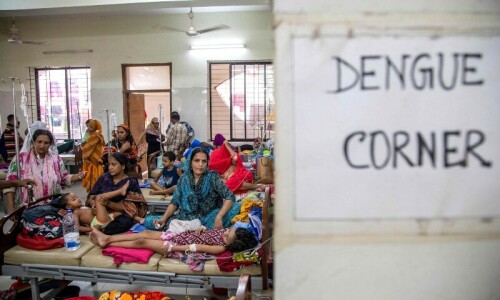
How will women be affected by the devolution process under way in line with the 18th Amendment? The relative silence from them — compared to the deafening noise from the pro- and anti-HEC lobbies — suggests that women are not concerned.
Devolution will not affect women in the same way as higher education which has been exclusively in the federal domain until now. Women’s development has been as much a provincial issue — if not more — as it has been the concern of the federal government. Senator Raza Rabbani, who is supervising the implementation of the 18th Amendment, is reported to have announced that the Ministry of Women Development (MoWD) will be devolved in the third stage, that is by June.
Few would quarrel with this move because having a multiplicity of bodies to do one job does not prove to be very productive like the proverbial excess of cooks who spoil the broth. Every province already has its Department of Women Development (DWD) entrusted with the “vital role of catalyst, lobbyist and influencer to attain the prime objective of women empowerment through gender mainstreaming”. This is how the Sindh DWD defines its mission.
True, the provincial bodies may not have performed as well as they are expected to. But that only highlights the need to look into and rectify the factors that handicap them.
The working of the MoWD in Islamabad has suffered from problems of another kind. It has structural weaknesses and being distanced from women at the grass-roots it functions more like an arm of the bureaucracy. Set up in 1979 as a division and upgraded in 1989 into a ministry with two other portfolios (social welfare and special education) tagged to it, its responsibility was primarily that of formulating public policies to meet the public needs of women. In 1996, when Pakistan ratified the Convention for the Elimination of Discrimination against Women (Cedaw), MoWD was assigned the task of ensuring its implementation.How successfully and effectively has it done this job? I will not go into gender-specific statistics because it would be unfair to expect a handful of bureaucrats in the MoWD to change the lot of women in a few years in a society that has been mired in social prejudices born of centuries-old patriarchal mindsets.
But the ministry has lacked the dynamism and initiative needed to perform its basic function as the implementer of Cedaw. I am referring to the reports a signatory of Cedaw is required to submit — the first within a year of ratification and then periodic reports every four years. From the MoWD’s website I learn that so far only one integrated report has been submitted in 2005 — when three should have been filed. The fourth report was due in 2009 but there is no indication of its fate.
In that case, one can well ask, whether we need at all a body at the federal level in Pakistan to safeguard the rights of women. The kind of body that is needed already exists and will not be — at least it should not be — affected by the devolution process. The National Commission on the Status of Women (NCSW) that was established by a presidential ordinance in July 2000 is a statutory and autonomous body mandated to examine the policies and programmes for women development and gender equality. It also reviews laws, rules and regulations affecting the status and rights of women and suggests repeal, amendment or new legislation essential to promote the interests of women.
The main idea of having an independent agency is to have a watchdog to keep an eye on the government’s policies vis-à-vis women. This is what such commissions all over the world do. If this body were to become an arm of the government its purpose would be defeated.
The NCSW’s performance has varied over the years. Initially, it was under the thumb of the MoWD and its chairperson was also a federal minister. Under the stewardship of Majida Rizvi, who displayed a good understanding of what was needed, the NCSW managed to assert some independence. It moved out of the premises of the ministry and acquired some support staff of its own.
Under Rizvi, the commission conducted research into the Hudood Ordinances — a curse on the women of Pakistan bequeathed to them by Gen Ziaul Haq. Thereafter, the NCSW strongly recommended the repeal of the Hudood law, which paved the way for the Women Protection Act of 2006.
A study of women commissions in India and South Africa indicates that our women’s commission would do better if it was further strengthened. Anis Haroon, currently chairperson of the NCSW and a key participant of Pakistan’s women’s movement, also agrees. An amendment bill she has put up to the cabinet grants investigative powers to the NCSW. It also provides for some structural amendments that would grant the commission administrative and financial autonomy, and makes it directly responsible to the prime minister. This should facilitate its effective performance.
Haroon feels that in many cases women do not receive the justice that is their due because of the weak investigation of crimes against women. If the commission were allowed to oversee that process, it may be possible to ensure that the police do their job efficiently and fairly. India’s commission even has judicial powers which Haroon has not asked for. She feels her purpose can be served if the investigation is done honestly.
www.zubeidamustafa.com













































Dear visitor, the comments section is undergoing an overhaul and will return soon.